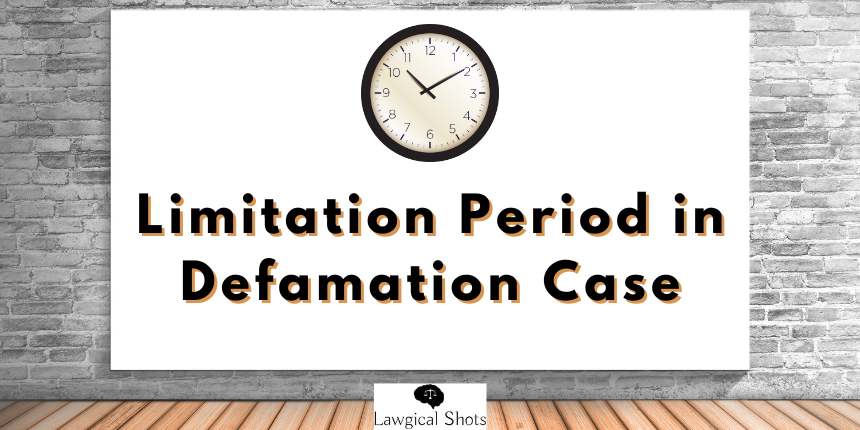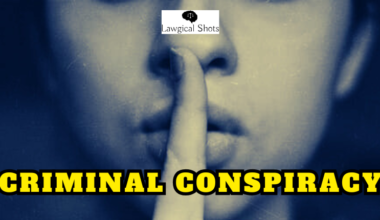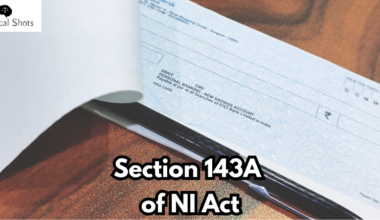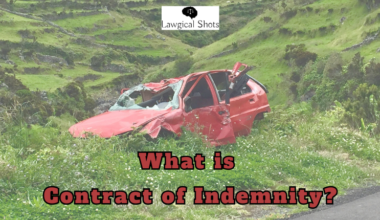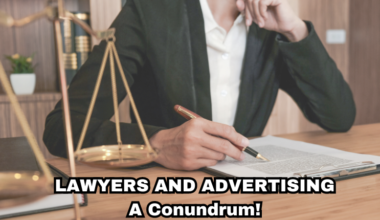Defamation laws in India are primarily governed by Civil and Criminal statutes, including the Bharatiya Nyaya Sanhita, 2023 (BNS), Bharatiya Nagrik Suraksha Sanhita, 2023 (BNSS) and Law of Torts. Defamation refers to the act of making a false statement that harms the reputation of an individual or an entity, as the case may be.
Understanding Limitation Period
Types of Defamation
1. Libel: Involves false and defamatory statements expressed in writing, print, or visible forms, with lasting effects.
Illustration: Defamatory comments about a person on social media.
2. Slander: Involves spoken defamatory statements or gestures.
Illustration: Spreading false rumors about someone at a public gathering.
Civil Defamation
Civil Defamation involves cases where a person or entity seeks compensation for damage to their reputation caused by defamatory statements. The primary remedy in civil defamation is monetary compensation, also known as damages.
Criminal Defamation
Criminal Defamation involves prosecution of individuals who have allegedly made defamatory statements. In India, criminal defamation is punishable under Section 356 of the Bhartiya Nyaya Sanhita (BNS)
A) Ingredients of Defamation
- False Statement: The statement must be false and not based on true facts.
- Publication: The defamatory statement must be communicated to at least one person other than the plaintiff.
- Harm to reputation: The statement must cause harm to the reputation of the plaintiff.
- Intent or Knowledge: The person making false statement must have the intention to harm or the knowledge that it is false and likely to harm the reputation.
B) Remedies
- Damages: The plaintiff can seek monetary compensation (damages) for the harm caused to their reputation.
- Injunction: In certain cases, the court may also grant an injunction to prevent further publication of the defamatory statement.
C) Burden of Proof
In Civil Defamation cases, the burden of proof lies with the plaintiff to establish that the defendant’s statement was false and caused harm to their reputation.
BNS Implications for Defamation
According to Section 356 (1) of BNS, defamation includes making or publishing imputations, whether spoken, written, or through visible representations, with the intent to harm a person’s reputation or with knowledge that it will cause harm.
Explanations
- Explanation 1 specifies that imputations about a deceased person can be defamation if they would harm the reputation if the person were alive.
- Explanation 2 extends defamation to imputations concerning companies or associations.
- Explanation 3 notes that imputations expressed ironically or in alternative forms may still constitute defamation.
- Explanation 4 establishes the criteria for imputations to be considered defamatory, including lowering moral or intellectual character, caste, calling, credit, or suggesting a loathsome state.
Exceptions to Defamation
Section 356 of BNS provides several exceptions to defamation:
a. Public Good
- Exception 1 states that imputations, even if true, are not defamation if made for the public good.
b. Opinion on Public Servants and Public Questions
- Exceptions 2 and 3 protect expressions of opinion about public servants or on public questions made in good faith.
c. Reports of Court Proceedings
- Exception 4 exempts substantially true reports of Court proceedings from being prosecuted for defamation.
d. Opinion on Case Outcomes
- Exception 5 protects opinions expressed in good faith about the merits of decided cases.
e. Opinion on Performances
- Exception 6 allows opinions on the merits of performances submitted to the judgment of the public.
f. Censure by Authorities
- Exceptions 7 and 8 protect censures by authorities or accusations made in good faith.
g. Protection of Interests
- Exception 9 allows imputations made in good faith for the protection of interests.
h. Cautionary Statements
- Exception 10 exempts cautionary statements made in good faith for the good of the person to whom it is conveyed.
Penalties for Defamation
Sections 356 (2), (3), and (4) of BNS outline the penalties for defamation, including imprisonment, fines, or community service.
Limitation period of Civil Defamation
- Legal Framework: The limitation period for filing a civil defamation suit in India is governed by the Limitation Act, 1963. Especially Article 75 of the Schedule to the Limitation Act stipulates the limitation period for suits related to defamation.
- Timeframe: The limitation for filing a civil defamation suit is one year from the date when the cause of action arises. The “cause of action” refers to the moment when the defamatory statement is made or published. This signifies that the aggrieved party has one year from the date of publication of the defamatory statement to initiate legal proceedings.
- Consequence of delay: If the defamed person fails to file the lawsuit within one year limitation period, the suit may be dismissed by the Court as “time – barred”. This means that the Court will not hear the case since it was not filed within the legally prescribed timeframe.
Example: If a defamatory article is published in a newspaper or on a social media platform on January 1, 2024, the aggrieved party must file the civil defamation suit by January 1, 2025. Any delay beyond this period could result in the case being dismissed, unless special circumstances justify the delay (accompanied by an application for condonation of delay).
Exceptions in Civil Defamation Cases (Libel/Slander)
Under Article 74 of the Limitation Act, 1963, a civil defamation suit must be filed within 1 year from the date of publication or knowledge of the defamatory statement. However, there are certain exceptions:
Discovery of Defamation
In some cases, the limitation period may begin from the time the plaintiff discovers the defamatory statement. This is especially relevant when the defamatory material is not immediately accessible to the plaintiff (e.g., if it was published in a foreign country or in a medium not easily available to the person).
Continuing Defamation
If defamatory statements continue to be made or published over a period, the limitation period may be extended for each subsequent publication. The limitation period may be reset every time a new defamatory statement is made or repeated.
Special Leave from Court
In exceptional cases, courts may grant an extension of the limitation period if there are valid reasons for delay, such as health problems or the plaintiff being unaware of the publication for a period.
Also read Landmark Judgments on Defamation
Limitation period of Criminal Defamation
The limitation period for filing a criminal defamation case is primarily governed by Section 514 of the Bharatiya Nagarik Suraksha Sanhita (BNSS), 2023.
Key Provisions of Section 514:
- Bar on Cognizance After Limitation Period: Courts are prohibited from taking cognizance of certain offenses after the expiration of specified limitation periods, except as otherwise provided in the Sanhita.
- Specified Limitation Periods:
- Six months: For offenses punishable with fine only.
- One year: For offenses punishable with imprisonment for a term not exceeding one year.
- Three years: For offenses punishable with imprisonment for a term exceeding one year but not exceeding three years.
- Determination of Limitation for Joint Trials:
- When multiple offenses are tried together, the limitation period is determined based on the offense with the most severe punishment.
- Computation of Limitation Period:
- The period of limitation is calculated from the date of filing a complaint under Section 223 or the date of recording information under Section 173 of the BNSS.
Section 515: Extension of Period of Limitation in Certain Cases
● This section provides circumstances under which the limitation period can be extended.
● For example:
a) Delayed discovery of the offense by the victim.
b) Reasonable cause shown for delays in filing complaints.
Exceptions in Criminal Defamation Cases
For criminal defamation, as per Section 468 of the Criminal Procedure Code (CrPC), the limitation period is 1 year from the date the offense is committed. However, certain exceptions apply to extend or modify this period:
a. Continuing Offense
In cases where defamatory statements are repeated, the offense could be treated as a “continuing offense.” In such cases, the limitation period may start anew with each repetition of the defamatory statement.
b. No Limitation in Cases of Defamation against Public Officials
If the defamation concerns a public official, particularly in the context of their public duties, criminal defamation laws may be applied without regard to the usual limitation period. Public figures often have a lesser expectation of privacy, but this can be complicated and needs to be evaluated based on the specifics of each case.
● Case Law: In Subramanian Swamy v. Union of India (2016), the Supreme Court upheld the constitutionality of criminal defamation under Section 499 and 500 of the IPC, stating that criminal defamation laws apply to both public and private individuals. While this case focused on the constitutionality of criminal defamation, it also pointed to the ongoing relevance of defamation laws in cases involving public figures.
c. Application for Extension of Time
In certain situations, a complainant can seek permission from the court to file a criminal defamation complaint beyond the prescribed limitation period, provided they show that there was sufficient cause for delay in filing the complaint.
d. Discretion of Magistrate
A Magistrate has the discretion to allow filing a defamation complaint beyond the limitation period in special circumstances, particularly when the facts of the case justify an extension.
This is a GUEST POST made by Ms Neha Sarma, serving those looking for answers to limitation period for defamation case – civil and criminal.
